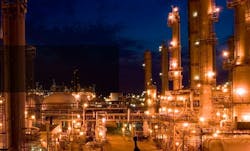Petrochemical firms pursuing Demonstration of Electric Steam Furnace in Hydrocarbon Cracking
Plastics developer Chevron Phillips Chemical and equipment manufacturer Technip Energies will collaborate with LyondellBasell to design, construct and operate a demonstration unit using an electric steam cracking furnace unit at the latter's plant in Texas.
The steam cracker, using Technip’s electric eFurnace technology, reportedly can use renewable electricity as a heat source for the olefins cracking process of the future. Steam cracking breaks saturated hydrocarbons down into smaller hydrocarbon fractions, producing olefins such as ethene or propylene which can used in processes to make plastics and other fuel resources.
LyondellBasell is a chemical processing firm. Chevron Phillips is a joint venture of Chevron Corp. and Phillips 66 focused on chemical development of olefins and specialty chemicals.
Construction of the demonstration unit, which would be the first for LyondellBasell, is considered by the company as an essential step in the development of eFurnace technology and a critical pre-condition for potential future construction of a full-scale unit. It will enable the company to test the technology and confirm continuous olefin production is possible using electricity as a heat source.
LyondellBasell has announced a mission to try and reduce its Scope 1 and 2 (both direct and in supply chain) greenhouse gas emissions.
“Deployment of an industrial-scale electric cracking furnace is one option we are considering in this space because of its ability to reduce furnace GHG emissions by up to 90 percent compared to a conventional furnace,” LyondellBasell CEO Peter Vanacker said in a statement.
A joint development agreement between the company, Technip and Chevron Phillips is expected to be signed later this year. The electric steam furnace would be located at LyondellBasell's plant in Channelview, Texas, according to reports.
Related story: Technip handling front-end engineering for ExxonMobil H2 project
"Climate change is a global issue that will take action from all segments of society, and we want to be part of the solution by reducing the intensity of our carbon footprint," said Bruce Chinn, President and CEO of Chevron Phillips Chemical. "This project supports our efforts toward lowering the carbon intensity of our operations and demonstrates our continued focus on accelerating change for a sustainable future."
Petrochemical production is focused mostly on converting hydrocarbon fractions into products such as plastics and other polymers. This cracking process often requires temperatures as high as 1,500 degrees Fahrenheit (850C). Firms in this sector such as Dow are working toward decarbonization efforts at plants along the Gulf Coast where many U.S. oil and gas pipelines and refineries are located.
Dow, for example, is exploring a collaboration with advanced reactor designer X-energy to use a small nuclear energy facility to power industrial operations. Nuclear energy also is carbon-free power generation.
Steelmakers such as ArcelorMittal and Algoma are testing electric furnaces as a means of decarbonizing their industrial work.
About the Author
Rod Walton, EnergyTech Managing Editor
Managing Editor
For EnergyTech editorial inquiries, please contact Managing Editor Rod Walton at [email protected].
Rod Walton has spent 17 years covering the energy industry as a newspaper and trade journalist. He formerly was energy writer and business editor at the Tulsa World. Later, he spent six years covering the electricity power sector for Pennwell and Clarion Events. He joined Endeavor and EnergyTech in November 2021.
Walton earned his Bachelors degree in journalism from the University of Oklahoma. His career stops include the Moore American, Bartlesville Examiner-Enterprise, Wagoner Tribune and Tulsa World.
EnergyTech is focused on the mission critical and large-scale energy users and their sustainability and resiliency goals. These include the commercial and industrial sectors, as well as the military, universities, data centers and microgrids. The C&I sectors together account for close to 30 percent of greenhouse gas emissions in the U.S.
He was named Managing Editor for Microgrid Knowledge and EnergyTech starting July 1, 2023
Many large-scale energy users such as Fortune 500 companies, and mission-critical users such as military bases, universities, healthcare facilities, public safety and data centers, shifting their energy priorities to reach net-zero carbon goals within the coming decades. These include plans for renewable energy power purchase agreements, but also on-site resiliency projects such as microgrids, combined heat and power, rooftop solar, energy storage, digitalization and building efficiency upgrades.

